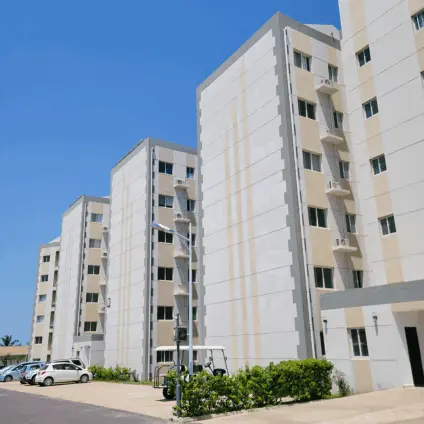Ghana’s real estate market presents a compelling opportunity for those looking to buy a house in Ghana. With a burgeoning economy and increasing urbanization, the demand for housing is on the rise. However, navigating this market, especially for first-time buyers, can feel like traversing uncharted territory. The process is often fraught with complexities, from understanding local regulations to identifying trustworthy developers. Waylead, a leading real estate developer in Ghana, offers a comprehensive guide to simplify this journey. This guide breaks down the process into eight essential steps, providing a roadmap to successfully purchasing property in Ghana.
The allure of owning a home in Ghana is undeniable. From the vibrant culture of Accra to the serene landscapes of the countryside, the country offers diverse living experiences. However, the dream of homeownership can quickly turn into a nightmare if one isn’t adequately prepared. Issues such as land disputes, fraudulent developers, and unclear legal processes can derail even the most enthusiastic buyers. This guide aims to equip you with the knowledge and tools necessary to navigate these challenges and make informed decisions.
Before diving into the specifics of property hunting and negotiations, it’s crucial to establish a solid foundation. The first step, determining your budget, is often overlooked but is arguably the most critical. It sets the stage for a realistic and successful home-buying experience. This involves a comprehensive assessment of your financial standing, considering income, savings, and existing financial obligations.
Once you determine your budget, you can begin your journey to buy a house in Ghana, keeping your finances in mind.
The next step involves choosing a location that aligns with your lifestyle and priorities. Ghana offers a plethora of options, each with its unique charm and advantages. From the bustling capital city of Accra to the industrial hub of Tema and the resource-rich region of Takoradi, the choices are diverse and appealing.
After that, shopping around and choosing a reputable real estate company is of utmost importance. Finally, this guide emphasizes the importance of inspections, price negotiations, due diligence, and closing the deal.
Embarking on the journey to buy a house in Ghana starts with a clear understanding of your financial capabilities. This involves a thorough assessment of your income, savings, and existing financial obligations. It’s about determining what you can realistically afford without overextending yourself. A common rule of thumb is to allocate no more than 40% of your monthly income to housing expenses. This includes mortgage payments (if applicable), property taxes, and insurance.
Payment modalities also play a crucial role in determining your budget. Are you planning to secure a mortgage, or will you be making an outright purchase? Mortgages come with their own set of considerations, including interest rates, down payment requirements, and repayment terms. Understanding these factors is essential for creating a realistic budget. Moreover, consider your long-term financial goals. Do you anticipate any major expenses in the near future, such as education costs or family planning? Factoring these into your budget will prevent any financial strain down the line. Ultimately, a well-defined budget serves as your compass, guiding you towards properties that align with your financial capabilities and ensuring a sustainable homeownership experience.
Ghana’s diverse landscape offers a wide array of locations, each with its unique appeal. Accra, the capital city, is a vibrant hub of commerce, culture, and entertainment. It offers a fast-paced lifestyle with access to a wide range of amenities, including international schools, world-class hospitals, and bustling markets. Tema, on the other hand, is an industrial city known for its port and manufacturing industries. It offers a more relaxed atmosphere compared to Accra and is a popular choice for families seeking a quieter environment. Takoradi, located in the Western Region, is a resource-rich area with a growing economy. It’s a popular destination for those seeking employment in the oil and gas industry.
When choosing a location, consider your priorities. Do you value proximity to your workplace? Are you looking for a neighborhood with good schools for your children? Do you prefer a bustling city or a quiet suburb? These factors will help you narrow down your options and find a location that truly suits your needs.
When considering where to buy a house in Ghana, it is important to prioritize proximity to essential amenities such as work, schools, and markets.
With your budget and location in mind, it’s time to embark on the property search. The internet is your best friend in this endeavor. Online portals such as Meqasa, Ghana Property Centre, and Jumia House offer a vast selection of properties for sale across the country. Use these platforms to browse listings, view photos, and gather information about available properties. Once you’ve identified a few properties that pique your interest, it’s time to narrow down your options.
Creating a comparison matrix can be incredibly helpful in this process. List the properties you’re considering and compare them based on factors such as pricing, features, amenities, developer credibility, and payment plans. This will provide you with a clear overview of the pros and cons of each property and help you make an informed decision. It is important to shop around to identify a property that meets your needs and budget.
Navigating Ghana’s real estate market requires caution and discernment. Partnering with a credible real estate company is paramount due to the inherent complexities and the potential for fraudulent activities. Sadly, the real estate sector in Ghana has seen its fair share of scams and disputes, leaving many buyers with shattered dreams and empty pockets. According to GREDA, partnering with credible companies significantly reduces potential risks. Choosing a reputable company will make it easier to buy a house in Ghana.
These credible companies possess the experience, expertise, and ethical standards to guide you through the process smoothly and protect your interests. But how do you identify a credible real estate company? One of the most reliable indicators is membership with GREDA, the Ghana Real Estate Developers Association. GREDA members adhere to a strict code of ethics and are committed to delivering high-quality properties. Seeking recommendations from experienced homebuyers is another valuable strategy. Talk to friends, family, or colleagues who have previously purchased property in Ghana and ask for their insights and recommendations. Online reviews and ratings can also provide valuable clues. Check Google Maps, Facebook reviews, and other online platforms to gauge the reputation of different real estate companies. Keep an eye out for red flags, such as consistent complaints about construction quality, delays, or customer service.
Ghana has witnessed a surge in modern, secure gated communities, offering residents a sense of security, community, and exclusivity. However, even in these upscale developments, quality assurance remains paramount. Don’t assume that everything is perfect just because it looks good on the surface. Thoroughly inspect any property that interests you, paying close attention to details such as building materials, finishes, and structural integrity. It is important to arrange inspections personally or with a professional surveyor.
Take note of the estate’s security measures. Are there adequate security personnel, surveillance cameras, and perimeter fencing? What are the management and maintenance policies? A well-maintained estate not only enhances the quality of life but also protects your investment. It is important to buy a house in Ghana that fits your needs in terms of security and accessibility.
Negotiation is a common practice in Ghana’s real estate market, and it’s an opportunity to secure the best possible deal. Don’t be afraid to negotiate the price, payment terms, or even the scope of work. Developers may offer discounts for early payments or bulk purchases, so be sure to inquire about available incentives. According to GREDA, discounts of up to 5-10% may be achievable depending on negotiation skills and payment terms. Evaluate offers based on total value: construction quality, developer reputation, amenities, and future property appreciation potential.
Due diligence is a critical step in the home-buying process that should never be overlooked. It’s about protecting yourself from future disputes or legal complications by thoroughly investigating the property and its history. According to Ghana’s Land Commission, property title disputes constitute a significant proportion of real estate litigations in the country. To mitigate these risks, it’s essential to verify land titles at Ghana’s Lands Commission. This will ensure that the property is legally owned by the seller and that there are no outstanding claims or encumbrances. Also, ensure that all property documentation, such as land title certificates or indentures, are legitimate and up-to-date.
Request a comprehensive offer letter from developers outlining payment plans, delivery timelines, and penalties for default. This will provide you with a clear understanding of your obligations and the developer’s responsibilities. Engage professionals to conduct thorough searches at the Lands Commission, ensuring the land titles are legitimate and free from encumbrances, before you buy a house in Ghana.
Once you’re satisfied with your due diligence and have negotiated the terms of the purchase, it’s time to finalize the deal. This involves reviewing and signing the purchase agreement, a legally binding document that outlines the rights and obligations of both parties. Before signing on the dotted line, it’s crucial to review the purchase agreement with a lawyer to protect your interests. The agreement should cover the total property price, payment schedule, clearly stated rights and obligations of both parties, warranty periods and conditions, and procedures for dispute resolution. Only sign the purchase agreement once you’re fully convinced that it protects your interests and accurately reflects the terms you’ve agreed upon.
Buying a house in Ghana can be a rewarding experience with the right knowledge and preparation. By following these 8 steps from Waylead, you can navigate the market confidently and secure your dream property. Remember to conduct thorough due diligence and seek professional advice when needed. Are you ready to buy a house in Ghana? Start your search today!
Image Source: MYJOYONLINE





















